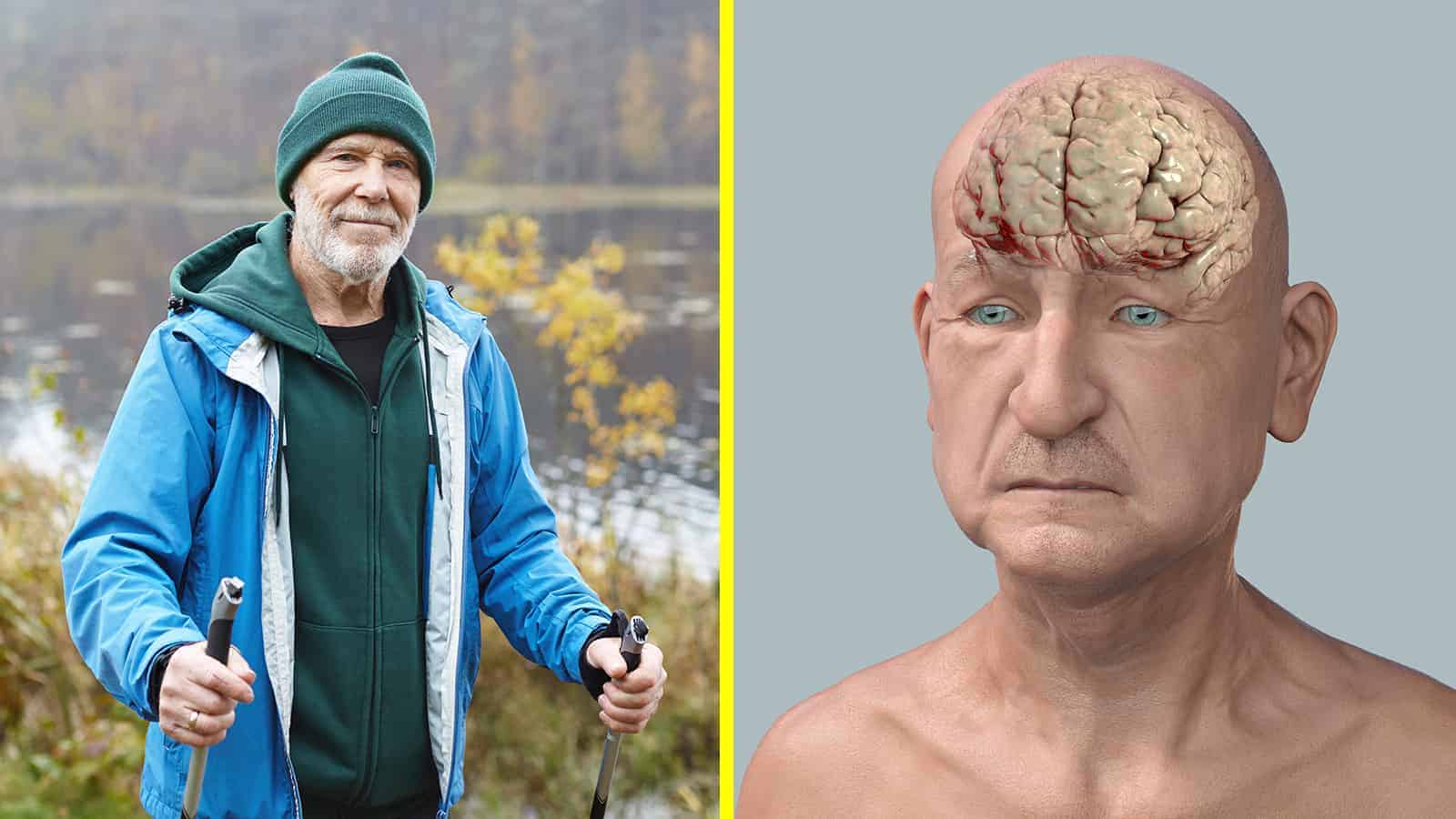The human body naturally begins to break down as you get older. You lose the energy and fitness you had in youth, and some parts of you need more care. Bone density drops, muscle mass declines, you tire more efficiently, and your cognitive functions begin to falter. Fortunately, you can prevent brain aging with one easy activity–walking!
The fear of an aging brain is one that many people have. The idea that you could reach a point where you cannot remember information and think well can be frightening. With brain size beginning to shrink at forty, how can you fight the process of cognitive decline?
The answer is more straightforward than you think. A basic form of exercise, performed regularly and consistently, can be all you need to keep your mind healthy. Can walking prevent brain aging? Science says so, and here’s how!
1. Walking Helps Prevent Brain Aging (Gray Matter)
When it comes to preventing brain aging, walking and other forms of exercise have been well-studied. Gray matter has been the chief subject of these studies, named for its grayish, pinkish appearance. It is the location of the brain’s nerve synapses, axon terminals, neuronal cell bodies, and dendrites.
For the most part, gray matter is essential for interpreting motor and sensory information. Without its health, your brain will struggle to send information throughout the body. It’s no wonder, then, that it was studied concerning aging brains so thoroughly! You see, the older you get, the less brain matter you tend to have, contributing to neurodegeneration.
A recent study showed that exercise could help maintain the volume of grey matter in later life. The study was titled “Cardiorespiratory Fitness and Gray Matter Volume in the Temporal, Frontal, and Cerebellar Regions in the General Population.” It was conducted by the German Center for Neurodegenerative Diseases and published in Mayo Clinic Proceedings.
This paper involved the use of 2,013 adults who ran from the year 1997 to 2012. Tests were conducted using peak oxygen uptake tests and data from MRI brain scans.
 Results showed that:
Results showed that:
- Cardiorespiratory exercise has a positive effect on gray matter volume, preventing its decline.
- Although one’s motor function is regulated by gray matter, the most apparent effects of the study are seen in cognition.
- In midlife, exercise is crucial to preventing the brain from beginning to degenerate. However, older individuals can also benefit similarly.
- Exercise can maintain healthy gray matter that can fight the risk of Alzheimer’s.
Walking is a commonly used form of exercise for older individuals, providing enough physical activity for these benefits. Simply taking a walk three times a week can be sufficient to maintain gray matter volume.
2. Walking To Prevent Brain Aging (White Matter)
White matter and its response to exercise are not as commonly studied, but it’s just as crucial for your brain’s health. This type of matter gains its white color from a coating of lipids and proteins called myelin. Myelin connects nerve signals, allowing white matter to process, send, and interpret the body’s signals.
Healthy white matter volume is essential to responsiveness, but it peaks at middle age and goes downhill! This means that even with a fit brain, you’ll lose white matter as you age. This makes trying to maintain its volume even more complicated – and even more critical.
Recently, a research paper determined that exercise is just as beneficial for white matter as for gray. Published in the Neuroscience journal, it is titled “White matter plasticity in healthy older adults: The effects of aerobic exercise.” The study took 247 individuals aged 60 and older, all with healthy brains but lacking activity. These participants were split into three groups. Each group was assigned to do one of the following activities:
- Supervised balance and stretching training
- Choreographed dances to learn and practice
- 40-minute brisk walks
The results were quite clear, taken with brain imaging and tests. After six months of work, those who walked had the most positive cardiovascular health and the best brain images. Many walkers also gained larger portions of the brain, higher white matter volume, and shrunken areas of damaged tissue lesions. On top of that, only the walkers gained better memory with their white matter improvements! This means that walking is better for the brain’s age, even when compared to vigorous dancing and balance training!
3. Walking For Age-Related Cognitive Decline
So, walking can reduce the risk of brain aging in elderly individuals. But what about those who already have begun exhibiting signs of cognitive decline? Do they benefit, too? This wasn’t fully understood for a long time, but new research shows it’s beneficial!
The study is titled “One-Year Aerobic Exercise Reduced Carotid Arterial Stiffness and Increased Cerebral Blood Flow in Amnestic Mild Cognitive Impairment.” It was published in the Journal of Alzheimer’s Disease and involved 70 individuals aged 55 and above. Each participant had signs or a diagnosis of some form of mild cognitive impairment and was sedentary.
At the start, participants were tested for their current cognitive function, fitness, blood circulation, and carotid artery stiffness. The carotid artery is responsible for bringing blood to the brain. Each person was then grouped into one of two groups and told to perform brisk exercises. One would achieve toning and light stretching exercises.
The other would engage in aerobic exercise by walking outdoors and on treadmills. The workout plan involved a thrice-weekly schedule for half an hour of supervised time. Then, once used to it, participants could add their workout sessions and continue their workouts for a year.
The results of the study were as follows:
- The walkers had gained improved aerobic capacity, endurance, and overall fitness.
- The walking group developed better blood flow to their brains and had reduced carotid artery stiffness.
- The walkers significantly outperformed the other group in executive function tests involving decision-making, planning, and cognition.
- Both groups enjoyed decreased declines in the aging and impairment of their brains, though the walkers had better rates.
It’s pretty clear that walking, therefore, not only prevents aging signs in brains but can also stall aging in progress.
 4. Heart-Healthy Habits Are Brain-Healthy Ones
4. Heart-Healthy Habits Are Brain-Healthy Ones
As a general rule, anything that is heart-healthy is also brain-healthy. The same things that prevent dangerous heart conditions, like heart attacks, can also prevent strokes and vascular dementia. Exercise is particularly notable for these functions. It’s already well-established that exercising is key to keeping your heart strong, so naturally, it does the same for the brain. Here’s how!
· Circulation
By boosting heart rate and cardiovascular activity, you increase the blood and oxygen flow throughout your body. Naturally, it builds and strengthens your heart, but that circulation also goes to the brain. This is important for keeping the organ sharp and healthy, according to studies.
· Stress
As its name suggests, stress puts a lot of, well, stress on your body. This means your body strains to handle the automatic fight-or-flight response from that stress. It’s no surprise that too much of this can then be bad for your well-being. People even joke about stress causing heart attacks – which it can! But it’s not just the heart that suffers from this. Research shows that stress can be a predictive factor in the risk of cognitive decline. Exercise releases endorphins and helps you to work off a lot of the pressure from stress, helping your heart and brain in the process.
· Blood Pressure
The improved circulation from exercise can also help to improve and balance blood pressure. High blood pressure is notorious for causing heart problems. It’s also a significant risk to aging brains, according to research. If your blood pressure isn’t at a healthy average, you’re more likely to develop neurological disease and dementia.
· Sleep
Exercise is a great way to encourage a good night’s sleep, helping you feel tired enough to rest easily. A lack of enough sleep can harm many organs in your body, including your heart. There’s a reason that the minimum required daily sleep is seven hours. It would be best if you had that time to rest and recover, and without it, you can get tired and strain yourself. But aside from its cardiovascular effects, a lack of sleep is also bad for the brain. Studies say that poor sleep can put you at risk of dementia.
5. How To Walk For Exercise…And To Prevent Brain Aging
Well, you now know that walking prevents brain aging. How can you apply that knowledge to your life with positive thinking? Sometimes, taking what you’ve learned and finding ways to incorporate it can be the hard part. So here are some tips for doing so to prevent brain aging safely and scientifically:
· Exercise Enough Times A Week
You need 150 minutes of exercise at a moderate intensity to reach the minimum recommended amount. Walking can be relaxing, of course! But if you want to use it to help your brain, you must get your blood pumping. Aim to walk briskly, not slowly, when you’re working out.
· Start Small
Yes, the goal might be 150 minutes of brisk walking per week. But it’s okay if it takes time to get to that level! If you’ve never spent much time working out before, starting an exercise regimen is daunting. Start with just ten minutes of brisk walking a day. Then, work your way up, gradually increasing the duration until you’re at your goal! Remember, even a little exercise is better than none, so maintain positive thinking!
· Take Opportunities To Walk
Get some extra walking time by taking up any chance you can (safely) do so. Park your car farther away, so you have to walk for longer. Take the stairs instead of the elevator. Instead of driving to the store five minutes away, walk. There are so many ways to get active by walking daily, and they make great habits!
 Final Thoughts On How Walking Can Prevent Brain Aging According To Science
Final Thoughts On How Walking Can Prevent Brain Aging According To Science
Walking is a simple exercise, and it’s also a very reliable one. It boasts many positive benefits for all sorts of organs and processes in your body. Whether you seek to prevent brain aging or improve overall health, it’s an easy and trustworthy choice!


















